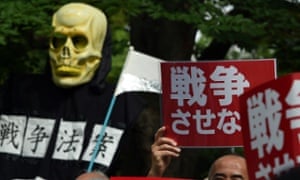Controversial plans by Japan’s prime minister, Shinzo Abe, to allow his country’s troops to fight on foreign soil for the first time since the second world war have sent his support ratings to their lowest level since he became leader in late 2012.
A poll by Nippon TV network found that almost two-thirds of respondents opposed the change, which requires new legislation to reinterpret Japan’s pacifist constitution.
Growing opposition could threaten Abe’s recent promise to Barack Obama that he will enact legislation currently being debated in parliament later this summer.
Article 9 of the postwar constitution, written by US occupation officials, prohibitsJapan from threatening or using force as means of settling international disputes. Successive administrations in Tokyo have interpreted that to mean that troops can only go into battle in defence of direct threats to Japanese territory.
A year ago, Abe’s cabinet reinterpreted the constitution, saying it did not prevent Japan from exercising its right to collective self-defence, or coming to the aid of an ally – almost certainly the US – even when Japan itself is not attacked.
That dramatic shift is reflected in new joint defence guidelines agreed in April between Tokyo and Washington.
On a visit to the US later that month, Abe pledged to push the changes through parliament by mid-August, when he will release a much-anticipated statement to mark the 70th anniversary of the end of the Pacific war.
The current parliamentary session is supposed to end on 24 June but could be extended to accommodate a vote on the collective self-defence bills.
But Abe, a conservative who has long argued for a more robust, internationally active military, is struggling to convince voters and constitutional experts.
The Nippon TV poll showed support for Abe falling to 41.1%, while 63.7% opposed collective self-defence. Almost 80% said the government had not properly explained the new legislation.
The poll results come soon after a respected expert on constitutional law invited to address a panel of MPs by Abe’s Liberal Democratic party [LDP] said the proposed changes were unconstitutional.
“The government should retract the bills because the core element of the bills – the use of the right of collective self-defence – is manifestly unconstitutional,” Yasuo Hasebe, a professor at Waseda University, told a news conference after his appearance.
The change would require outright constitutional reform, Hasebe added – an option Abe has apparently abandoned for now due to public opposition.
Two other experts said government assurances that potential missions would be strictly non-combative and risk-free were misleading.
In response, Abe told reporters at the G7 summit in Germany last weekend that Japanese forces would operate “under the world’s strictest conditions on the use of force” and exercise the right to collective self-defence “in a restrained manner”.
The security bills would remove geographical constraints on where Japanese troops could operate in “situations that would significantly affect Japan’s security”.
They would also allow them to defend allies “in situations where there is a clear risk that Japan’s existence is threatened and its people’s rights … are compromised through an attack on a country which has a close relationship with Japan”.
Opponents say that Abe’s new interpretation is too broad and would risk dragging Japanese troops into US-led conflicts.
The LDP and its junior coalition partner, New Komeito, have comfortable majorities in both houses, but would be wary of alienating voters in order to satisfy the US, which wants Japan to play a bigger role in bilateral security ties to counter an increasingly assertive China.
“It depends on public opinion,” said Atsuo Ito, a political commentator. “Some LDP executives are now wondering which is the bigger risk: breaking a promise to Washington, or damaging public support.”
About 25,000 people demonstrated in Tokyo on Sunday in defence of the pacifist constitution, organisers said.




